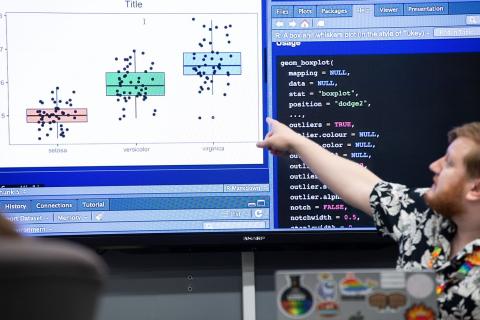2026 Summer Internships in Computational Biology
Includes bonus 2-week morning bootcamp where students learn Python, R, and biology
Opportunities
- High School Internships
- Undergraduate Internships
- No previous experience required, but demonstrated interest in STEM preferred.

What to Expect
Our Earth and biological sciences researchers are awesome. Inherently curious and lifetime learners, our group of mentors enjoy sharing their expertise with students considering a career in a science, technology, engineering, or mathematics field.
Depending on your mentor and the work scope, you may observe experiments in a laboratory. Most of your time, though, will be spent learning about the scientific questions we’re trying to answer and how computation and biology are intertwined. Interns 18 and over may be able to directly work in a laboratory setting.
Your internship has purpose. Some internship projects will support our computational biology group and others will support an internal Pacific Northwest National Laboratory (PNNL) investment called the Predictive Phenomics Initiative. Computational biology and data science is a common theme among the projects. During your internship, you’ll present your project progress to mentors and leaders, giving you an opportunity to hone presentation and public speaking skills.
Duration
Internships are 8 weeks long, begin after June 2 and end by August 11. Within the 8-week period, students will participate in a 2-week “bootcamp” focused on computational biology.
- Early start date: June 2nd (8 weeks)
- Late start date: June 16th (8 weeks)
Location

All internships will be in-person at on the PNNL-Richland campus. During the summer, PNNL hosts roughly 1,500 students, increasing our campus population to more than 6,000. We have fun summer offerings for all staff, such as outdoor farmers' markets and food trucks, and interns are treated to the Gold Experience - an intentional platform to launch your future science, technology, engineering, and mathematics career.
The campus assumes a collegiate feel with various planned activities for interns, as well as summer offerings for all staff, such as outdoor farmers' markets and food trucks.
How to Apply
Our undergraduate internship positions are currently open and the high school internship positions will open soon.
Learn about other programs across PNNL or apply to other available positions here.
Bonus 2-Week Morning Computational Biology Bootcamp
Required for high school and undergraduate interns applying to the internships on this page
Our bootcamp leaders are computer nerds at heart. Whether it’s analyzing massive amounts of data they receive from researchers or developing complex code for a model, they always go back to basics, including understanding a little bit of biology.
Join computational biologists David Degnan and Bailey Knight, in a 2-week collaborative training workshop experience where students will learn Python, R and biology—together—under the instruction of an expert. It is not school. There are no tests or quizzes. Instead, our leaders want to bring all students to the same base level of skills, thus building a cohort of individuals who can help each other as they run into issues coding issues during their internship project.
All high school and undergraduate students, regardless of background, should attend the bootcamp. We’ll meet for 2.5 hours each morning, for two weeks. Another bonus: you’ll have the opportunity to meet students from other internship programs because the bootcamp is open to all interns. Our bootcamp leaders are computer nerds at heart. Whether it’s analyzing massive amounts of data they receive from researchers or developing complex code for a model, they always go back to basics, including understanding a little bit of biology.
A sampling of this year's topics includes R (base functions, tidyverse, visualizations, basic statistics), Python (algorithmic programming, object-oriented programming), code management (git), biology (molecular biology, genetics, microbiology, and omics), and a coding challenge to round out bootcamp.